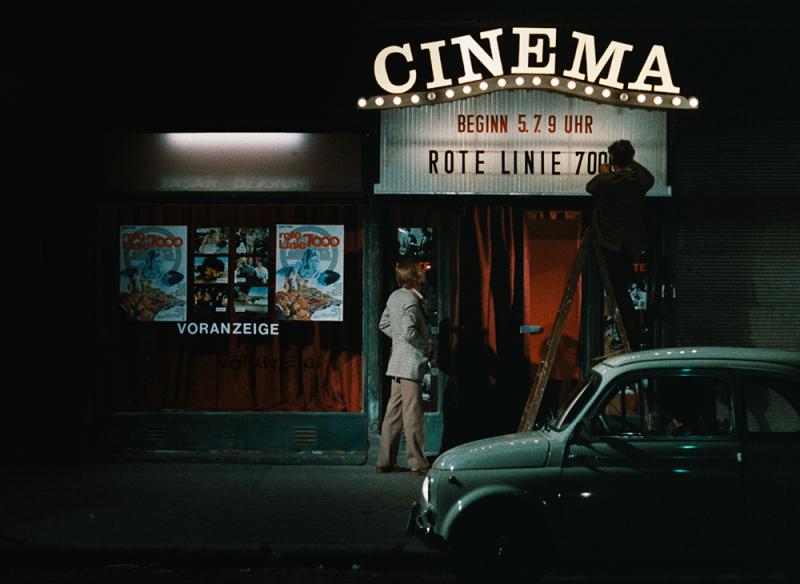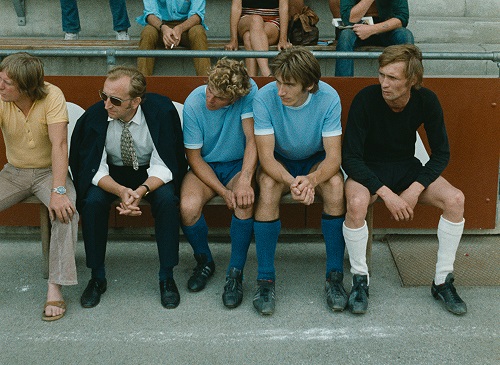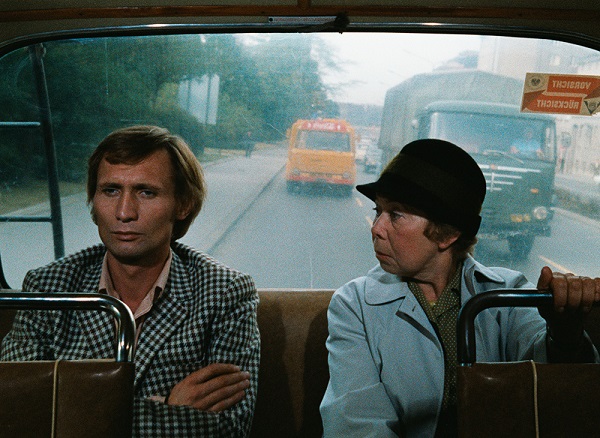DVD/Blu-ray: The Goalie's Anxiety at the Penalty Kick | reviews, news & interviews
DVD/Blu-ray: The Goalie's Anxiety at the Penalty Kick
DVD/Blu-ray: The Goalie's Anxiety at the Penalty Kick
No particular place to go: refreshed soundtrack revives Wim Wenders's debut feature

The invaluable work being carried out by the Wim Wenders Foundation to preserve the legacy of the great German director continues to bear fruit.
The challenges – much more than just repairing images drawn from some very tired original prints (though that was considerable work too, as an accompanying extra here, Restoring Time, reveals) – were particularly demanding in the case of two early films. His 1973 Alice in the Cities needed reframing, to correct the ratio from its original TV broadcast standards to the one in which Wenders and his longterm DP Robby Müller had filmed it. With the director’s debut film The Goalie's Anxiety at the Penalty Kick, from 1971, the issue was the soundtrack: Wenders’s extensive use of American rock/pop material – much of it played from his beloved jukeboxes – had been cleared only for German distribution, which made the film effectively unavailable internationally for almost 45 years.
 In an interview that comes as an extra on this release, Wenders describes how that problem was resolved, through technical “wizardry” that saw the tracks that would have been prohibitively expensive to clear removed from the surviving mono mixtape, and new “lookalike” (matching in style and length) material, specially composed, performed and recorded (in analogue), inserted in their place. The happy exception in this general substitution came with Van Morrison’s “Gloria”: playing over a fight scene, its removal would have been almost impossible. Wenders finally approached his hero, who gave the rights for free.
In an interview that comes as an extra on this release, Wenders describes how that problem was resolved, through technical “wizardry” that saw the tracks that would have been prohibitively expensive to clear removed from the surviving mono mixtape, and new “lookalike” (matching in style and length) material, specially composed, performed and recorded (in analogue), inserted in their place. The happy exception in this general substitution came with Van Morrison’s “Gloria”: playing over a fight scene, its removal would have been almost impossible. Wenders finally approached his hero, who gave the rights for free.
The director surely overplays his own naivety somewhat in recalling how The Goalie's Anxiety came to be made: indeed, he sounds practically astonished that his 25-year-old self, with just two shorts and a graduation film behind him, could have been standing up in front of a real crew and cast for a four-week shoot (it was shot chronologically, Wenders claiming here that he didn’t know there was any other way). And the German cinema landscape can’t have been quite as bleak as he remembers it here: he felt that becoming a film director was about as realistic as going to the moon. The success of Wenders’s old friend Peter Handke’s source novel brought in majority funding from German public television WDR, as well support from Austria, where its action is set, starting in Vienna before moving to the Burgenland countryside.
Most of all this is a story of monotony, of alienation
After all, Wenders had absorbed a huge cinematic heritage by then, not least that of Alfred Hitchcock whose influence he acknowledges here, as well as the impact of American culture in general (“the Yanks have even colonised our subconscious,” he would later write). He certainly added something distinctive to the road movie genre in his story of Joseph Bloch (Arthur Brauss, pictured below, left) and his seemingly motivationless wanderings; the significance of his titular profession is minimal from the film’s opening episode through until an allusion in its final scene.
The description of the film as an “existential thriller” appears to have left Wenders bemused too, though he certainly plays with elements of the latter in a (very) loose crime detection strand. Most of all this is a story of monotony, of alienation, one which reflects both post-war Germany’s troubled past and its location on the boundary of the Cold War. Bloch’s central – indeed, his only – defining action is committed with a randomness that is all the more chilling for being so casual (shades of Camus and L’Etranger there, perhaps).
 Unrelieved bleakness? Not quite, with elements of deadpan humour growing as the film progresses. The colour correction in this restoration certainly showcases some very generous hues that at times almost contradict the starkness of story, the countryside scenes especially emanating rather more Gallic warmth than Teutonic chill. Müller’s cinematography perfectly matches Wenders's sense of control, reinforced by the deceptive simplicity of the score by Jurgen Knieper (another future collaborator).
Unrelieved bleakness? Not quite, with elements of deadpan humour growing as the film progresses. The colour correction in this restoration certainly showcases some very generous hues that at times almost contradict the starkness of story, the countryside scenes especially emanating rather more Gallic warmth than Teutonic chill. Müller’s cinematography perfectly matches Wenders's sense of control, reinforced by the deceptive simplicity of the score by Jurgen Knieper (another future collaborator).
It’s the work of a director who has discovered that understatement can be a powerful form of statement. And certainly a step on from Same Player Shoots Again, his 1967 student film included here, that has the director playing stylistic games with colouring, music and editing (characteristically, he compared the experience to playing a pinball machine). If that was Wenders experimenting, in The Goalie's Anxiety we can feel a sense of style in formation. It's great to have it back – and looking so good.
rating
Explore topics
Share this article
The future of Arts Journalism
You can stop theartsdesk.com closing!
We urgently need financing to survive. Our fundraising drive has thus far raised £49,000 but we need to reach £100,000 or we will be forced to close. Please contribute here: https://gofund.me/c3f6033d
And if you can forward this information to anyone who might assist, we’d be grateful.

Subscribe to theartsdesk.com
Thank you for continuing to read our work on theartsdesk.com. For unlimited access to every article in its entirety, including our archive of more than 15,000 pieces, we're asking for £5 per month or £40 per year. We feel it's a very good deal, and hope you do too.
To take a subscription now simply click here.
And if you're looking for that extra gift for a friend or family member, why not treat them to a theartsdesk.com gift subscription?
more Film
 Can I get a Witness? review - time to die before you get old
Ann Marie Fleming directs Sandra Oh in dystopian fantasy that fails to ignite
Can I get a Witness? review - time to die before you get old
Ann Marie Fleming directs Sandra Oh in dystopian fantasy that fails to ignite
 Happyend review - the kids are never alright
In this futuristic blackboard jungle everything is a bit too manicured
Happyend review - the kids are never alright
In this futuristic blackboard jungle everything is a bit too manicured
 Robert Redford (1936-2025)
The star was more admired within the screen trade than by the critics
Robert Redford (1936-2025)
The star was more admired within the screen trade than by the critics
 Blu-ray: The Sons of Great Bear
DEFA's first 'Red Western': a revisionist take on colonial expansion
Blu-ray: The Sons of Great Bear
DEFA's first 'Red Western': a revisionist take on colonial expansion
 Spinal Tap II: The End Continues review - comedy rock band fails to revive past glories
Belated satirical sequel runs out of gas
Spinal Tap II: The End Continues review - comedy rock band fails to revive past glories
Belated satirical sequel runs out of gas
 Downton Abbey: The Grand Finale review - an attemptedly elegiac final chapter haunted by its past
Noel Coward is a welcome visitor to the insular world of the hit series
Downton Abbey: The Grand Finale review - an attemptedly elegiac final chapter haunted by its past
Noel Coward is a welcome visitor to the insular world of the hit series
 Islands review - sunshine noir serves an ace
Sam Riley is the holiday resort tennis pro in over his head
Islands review - sunshine noir serves an ace
Sam Riley is the holiday resort tennis pro in over his head
 theartsdesk Q&A: actor Sam Riley on playing a washed-up loner in the thriller 'Islands'
The actor discusses his love of self-destructive characters and the problem with fame
theartsdesk Q&A: actor Sam Riley on playing a washed-up loner in the thriller 'Islands'
The actor discusses his love of self-destructive characters and the problem with fame
 Honey Don’t! review - film noir in the bright sun
A Coen brother with a blood-simple gumshoe caper
Honey Don’t! review - film noir in the bright sun
A Coen brother with a blood-simple gumshoe caper
 The Courageous review - Ophélia Kolb excels as a single mother on the edge
Jasmin Gordon's directorial debut features strong performances but leaves too much unexplained
The Courageous review - Ophélia Kolb excels as a single mother on the edge
Jasmin Gordon's directorial debut features strong performances but leaves too much unexplained
 Blu-ray: The Graduate
Post #MeToo, can Mike Nichols' second feature still lay claim to Classic Film status?
Blu-ray: The Graduate
Post #MeToo, can Mike Nichols' second feature still lay claim to Classic Film status?

Add comment